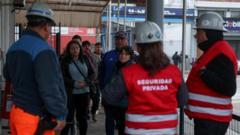As the Israeli military strikes intensify and the cost of living skyrockets, Hamas’s financial operations remain intact, providing civil servants with meager salaries amidst dire food shortages and rising public resentment.
Hamas's Secret Salary Payment System Amidst Crisis

Hamas's Secret Salary Payment System Amidst Crisis
Despite severe challenges, Hamas continues to utilize a covert payment method for keeping its civil servants’ salaries afloat in war-torn Gaza.
In Gaza, Hamas has implemented a clandestine cash distribution system to pay approximately 30,000 civil servants their salaries, which now amount to only a fraction of their pre-war earnings. Despite the ongoing conflict, the group has managed to allocate around $7 million every ten weeks, currently disbursing around $300 to each employee. However, with inflation spiraling, the small payments have only amplified discontent among workers who endure significant hardships, including acute malnutrition and severe food scarcity.
With the local banking system in ruins, receiving these meager salaries remains an elaborate and often perilous task. Civil servants receive anonymous instructions via encrypted messages, directing them to meet in secret locations to collect their wages, often wrapped in sealed envelopes. Many, like a schoolteacher identified as Alaa, describe the anxiety intertwined with these transactions, highlighting the dangers of accessing their own pay amidst Israeli strikes targeting salary distribution sites.
It’s been reported that Hamas had stockpiled around $700 million in cash before the conflict escalated, allowing it to continue salary payments despite the collapsing administrative framework. Hamas historically has relied on taxes and support from foreign entities, with cash inflow options severely restricted by the war.
In its pursuit to generate revenue, Hamas has enforced heavy taxes on traders and inflated prices on everyday goods, including cigarettes that now cost significantly more than before the war. The distribution of food aid to Hamas supporters has further inflamed public discontent, with claims that the organization preferentially helps its own members while sidelining the broader population struggling for survival.
Amidst escalating frustrations, individuals like Nisreen Khaled implore for equity in aid distribution, as many family members rely on scarce supplies while Hamas points fingers at international restrictions and accusations of stealing humanitarian aid.
While the situation in Gaza continues to deteriorate, the resilience of Hamas’s underground financial operations remains a critical question as families grapple with hunger and an uncertain future.
With the local banking system in ruins, receiving these meager salaries remains an elaborate and often perilous task. Civil servants receive anonymous instructions via encrypted messages, directing them to meet in secret locations to collect their wages, often wrapped in sealed envelopes. Many, like a schoolteacher identified as Alaa, describe the anxiety intertwined with these transactions, highlighting the dangers of accessing their own pay amidst Israeli strikes targeting salary distribution sites.
It’s been reported that Hamas had stockpiled around $700 million in cash before the conflict escalated, allowing it to continue salary payments despite the collapsing administrative framework. Hamas historically has relied on taxes and support from foreign entities, with cash inflow options severely restricted by the war.
In its pursuit to generate revenue, Hamas has enforced heavy taxes on traders and inflated prices on everyday goods, including cigarettes that now cost significantly more than before the war. The distribution of food aid to Hamas supporters has further inflamed public discontent, with claims that the organization preferentially helps its own members while sidelining the broader population struggling for survival.
Amidst escalating frustrations, individuals like Nisreen Khaled implore for equity in aid distribution, as many family members rely on scarce supplies while Hamas points fingers at international restrictions and accusations of stealing humanitarian aid.
While the situation in Gaza continues to deteriorate, the resilience of Hamas’s underground financial operations remains a critical question as families grapple with hunger and an uncertain future.

















